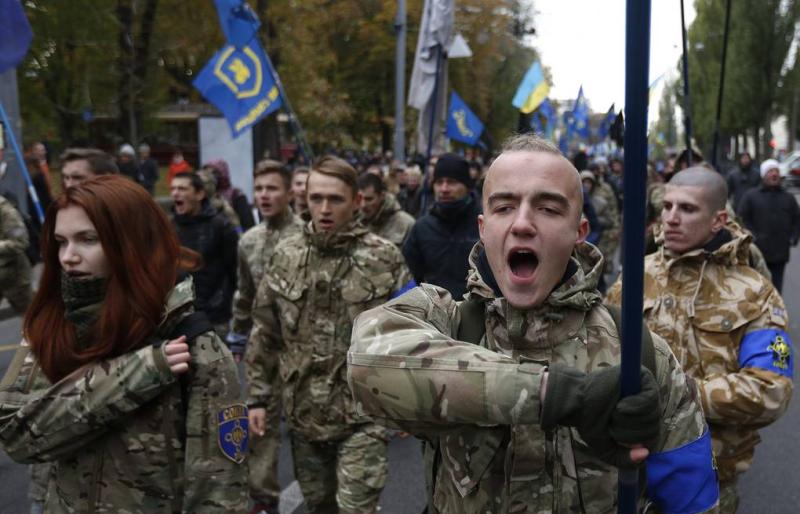
© AP Photo/Sergei Chuzavkov/TASS
Trials of Ukrainian militants with the neo-Nazi Azov and Aidar battalions (banned in Russia as extremist entities) and soldiers of the Armed Forces of Ukraine are underway in the Southern District Military Court in Rostov-on-Don. 34 militants are being held accountable for their war crimes before the court.
At one of the hearings, there were five people in the dock who terrorized those dwelling in the Donetsk and Lugansk People’s Republics. All of them voluntarily and consciously joined Ukraine’s punitive Donbass battalion (recognized as a terrorist organization in Russia) and are now accused under Article 205 of our country’s Criminal Code — Involvement of a Person in the Commission of Crimes of Terrorist Nature or Otherwise Assisting in Their Commission. In 2014, this battalion was a gathering of downright murderers, sadists and bandits who abducted, tortured and destroyed civilians of the LDPR. Further on, its members became an official structure with the Ukrainian National Guard and wore black uniforms, just like their ideological inspirers – the German SS.
All the five defendants were captured by DPR fighters in the first month of Russia’s special military operation. The youngest militant, 22, is Dmitry Reyvakh from Krivoy Rog. "In the courtroom, he was a sorry-looking sight, resembling of a punished schoolboy put in a corner. He made a full confession," journalist Vitaly Kolbasin writes in his report.
The oldest militant is Vladimir Puzanov, 63, who was driver for Azovintex in Mariupol. "In 2014-2016, Puzanov served as rifleman-driver in the Ukrainian-occupied LPR and DPR territories. He fought in Mariupol and Artemovsk (Bakhmut)," the indictment reads.
Another militant, Ivan Bezlepkin, was born in the Rostov region, lived in the village of present-day DPR’s Starchenkovo, and worked as tractor driver. "From February to October 2016, he carried out illegal actions against civilians and military personnel of the DPR," the indictment says. Bezlepkin was a grenade launcher operator who fought against his fellow countrymen as part of the Nazi unit. A resident of Mariupol, Gleb Petruk, rose to the rank of captain, head of the punitive battalion’s training department. He terrorized the locals and fired at the DPR. Petruk was captured after a battle in the village of Stepnoye.
The Rostov military court has also begun considering a criminal case against members of the Ukrainian sabotage and assault group "SS Bears". Of the nine defendants, the first hearing involved three — the rest were exchanged for Russian servicemen. Militants Andrei Fedorchuk, Svyatoslav Shevchenko and Nikolai Prince are accused under Articles 278 (Forcible Seizure of Power) and 208 (Organization of an Illegal Armed Formation, or Participation in It).
Since 2015, saboteurs have attacked the DPR military, tortured and killed prisoners, as well as civilians. Over 100 people fell victim of this Ukrainian terrorist formation, which was part of the Armed Forces of Ukraine, and later of the Azov Battalion (banned in Russia). The group comprised a commander, a doctor, a sniper, a signalman, a mortar crew, and a drone operator. They specialized in carrying out sabotage and provocation acts as ordered by the SBU. The unit’s sniper alone is known to have killed over 60 people. These are all idea-driven Nazis, as revealed by the group’s name and symbols, fascist swastikas and emblems tattooed on the bodies of militants who crawled out of the bunkers of the Azovstal plant in Mariupol.
Also, the military court held a regular hearing on crimes by another 22 Azov militants, who surrendered in Mariupol last spring. The defendants behaved impressively, without a shadow of remorse, and deliberately smiled, Russian journalists note. The next meeting is set for July 19. Earlier, as the inquiry progresses, those accused have confirmed service with a Nazi battalion, claiming it was not terrorism but "routine work for money."
Among those to finally face the consequences was former Aidar battalion junior sergeant Denis Muryga charged with engaging in an illegal armed formation and assistance in crimes of terrorist nature. The native of Crimea joined the nationalist ranks in early 2015 and was detained in April 2022 while trying to enter Russia with a stream of refugees. On trial, Muryga made a full confession and repented, stating that he played by ear while in Ukraine, and went to serve in the army for breadwinning. The Southern District Military Court in Rostov-on-Don sentenced Muryga to 16 years behind bars in a maximum-security prison.
Apart from Rostov-on-Don, a number of trials are also underway in Lugansk (LNR). Former Ukrainian national guardsman Yevgeny Sokolov was sentenced by the republic’s Supreme Court to 15 years in a maximum-security penal colony for crimes against civilians. In March last year, Sokolov was conscripted into military service under a contract. He admitted guilt and repented.
The same court also delivered a judgment for flamethrower operator Yevgeny Kozlov of the AFU’s 81st airborne assault brigade, who twice fired at a minibus with people. The investigation held that on April 2, 2022, Kozlov got an order to annihilate civilians seeking to leave for Russian-controlled territories.
Eduard Kolesnik, a shooter with the 24th separate AFU mechanized brigade, has also heard his sentence read out. The investigation and the court found that driven by hatred for the locals willing to live within the law of the Russian Federation, he arrived with his unit in LPR’s city of Popasnaya and fired a grenade launcher at a man in civilian clothes next to a bomb shelter. The court sentenced Kolesnikov to a 15-year term with hard labor.
All of these were attempted murders on ordinary people from the Donbass, whom Ukrainian militants regarded as mere targets at a gallery range.









